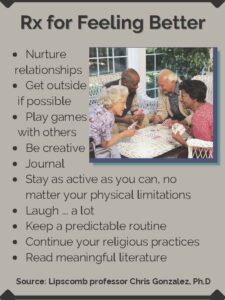
Forward Thinking – Depression can disguise itself as grief or sadness
With the holidays upon us, family gatherings – especially multi-generational ones – offer the opportunity to reconnect with loved ones we don’t see often. This is especially true as we come out of the pandemic that shut down most Thanksgiving feasts last year.
The holidays also provide an opportunity to assess how your older friends and relatives are doing physically and mentally. Look for opportunities to ask them about their lives and really listen to their answers. This is especially important if they have experienced a recent loss of a spouse or another significant person in their lives.
On Wednesday, Dr. Chris Gonzalez, director and founder of Lipscomb University’s Master of Marriage and Family Therapy Program, visited The Heritage at Brentwood to present a program on depression and share how it differs from grieving and sadness. I sat in and am so glad I did.
Here are several takeaways that deserve a much deeper dive, but I hope they may start some meaningful conversations this holiday season.
No. 1 Takeaway: No one is immune
Depression can affect “just about anyone,” Gonzalez says. It affects people of any age and race. A family history of depression can increase one’s chances of having it but is not necessarily a determining factor. Most importantly, being depressed is not a sign of weakness, lack of faith or not trying hard enough to beat it. “It’s a sign of how much you have to bear.”
Take the time to learn depression’s symptoms and know that as one ages, it often presents itself in different ways.
Older men are more likely to be angry, apathetic and lose interest in everything. Women may feel it somewhere in their bodies. It might present itself through a migraine, tension or a prolonged feeling of confusion. “Bouts of confusion will be frequent with a woman in later life who has depression,” Gonzalez shares.
Depression is also more likely to be tied to health conditions as one ages, including cognitive impairment, anxiety and/or a chronic health problem. “All of these add weight and it’s harder to carry.”
The good news? “Although almost anyone can have depression,” the therapist shares. “Most people don’t.”
No. 2 Takeaway: You can be sad and not be depressed.
There are a lot of differences between sadness and depression. For example, sadness is temporary. Depression is an overwhelming weight that lasts an extended period.
You can still enjoy your favorite things when you’re sad, but they’ll no longer bring joy if depressed. Even if you’re sad, you’re probably still sleeping well. Depression can wreak havoc with your sleep, causing you to sleep way too much or to spend hours awake, often worrying about something you can’t control.
With sadness, you may feel regret about something. With depression, you can experience “an excessive guilt and regret that takes over.”
Then there’s food. When you’re sad, you still have an appetite. The opposite is true with depression. People often “try to solve a problem with food without it being a food problem,” Gonzalez says, whether by eating too much or too little.
No. 3 Takeaway: Don’t suffer alone
If you think you may be clinically depressed, “talk through the symptoms with someone you trust – a friend, an adult child, a therapist,” Gonzalez suggests. Talking about what you’re experiencing is “really, really helpful.” Not addressing it can be a costly mistake.
By sharing, “It starts to cut it in half,” he says. “Do not suffer in silence. Split it up; share your burdens. It’s not shameful or embarrassing to have depression.”
In fact, he adds, “You’re not strong if you stay silent; you’re strong if you share.”
If you observe signs of depression in someone you love, reach out to them. Listen. Offer to help them find help.
No. 4 Takeaway: Try therapy first
The medications to treat depression are getting better all the time, Gonzalez says, but aren’t a one-size-fits-all treatment. They must be prescribed by a
medical doctor, nurse practitioner or psychiatrist who can adjust dosages or change medications to find the right one for each individual patient.
Gonzalez suggests trying therapy first. A well-trained therapist, he says is kind and compassionate, a good listener and not judgmental. He or she will learn your strengths and highlight them.

And a few final takeaways shared by Gonzalez that everyone needs to remember:
- You’re alive in this world and you’re valuable.
- You matter.
- You have always mattered
- You always will matter
- Your life has made meaningful ripples worth remembering.
- Your life has made meaningful ripples you’ll never know about.
When Gonzalez shared these final bullet items, I thought immediately about one of my favorite movies. In “It’s a Wonderful Life,” George Bailey learns – just in time – that life is worth living and that his life has — and always has had — value. I invite you to take the time to watch it again this year to remind yourself or someone you love that like George Bailey, we all have positively impacted others’ lives more than we realize.
Happy Thanksgiving everyone!
By SUSAN LEATHERS
Susan Leathers is a Brentwood-based journalist with a keen interest in aging issues. Send suggestions for future columns to [email protected]. This monthly column is sponsored by The Heritage at Brentwood, Williamson County’s only senior living LifeCare Community. For more information, call 615-507-2686 or visit www.theheritagelcs.com


